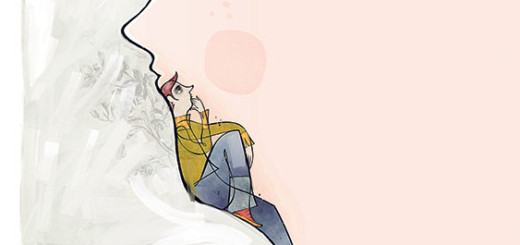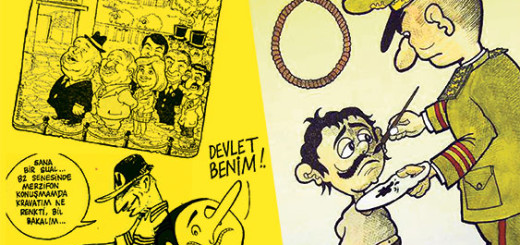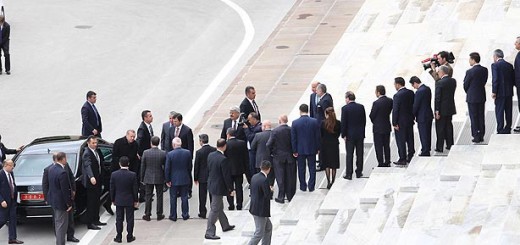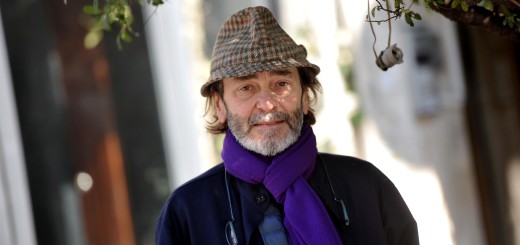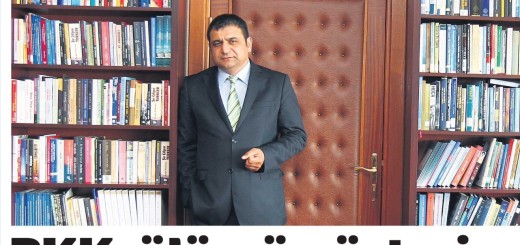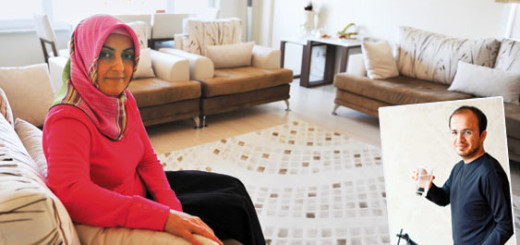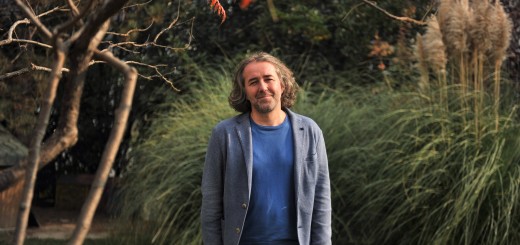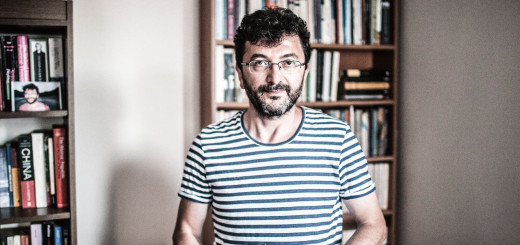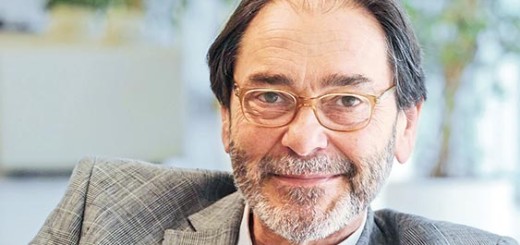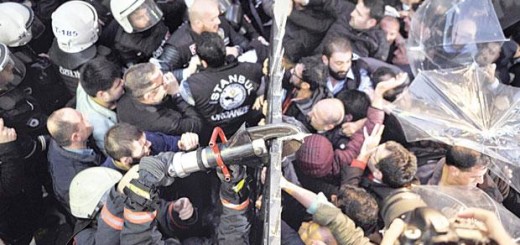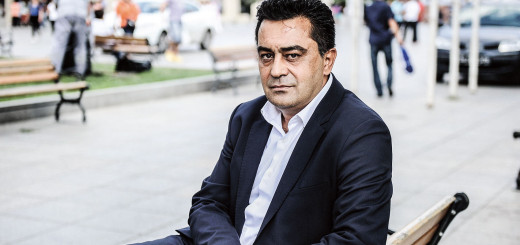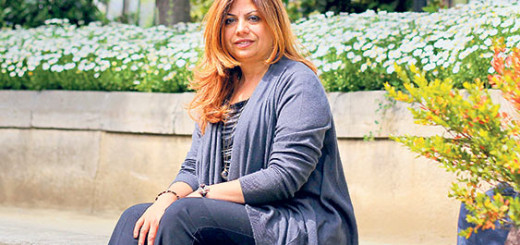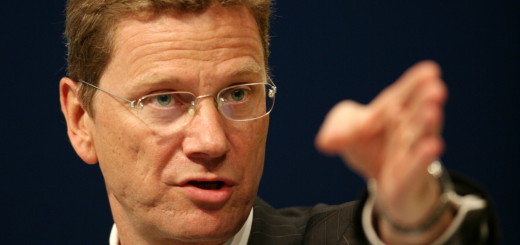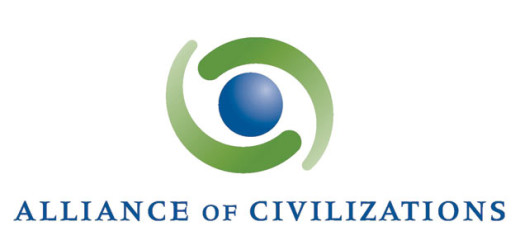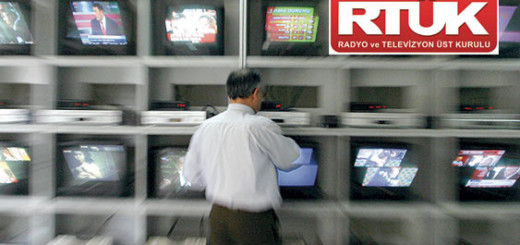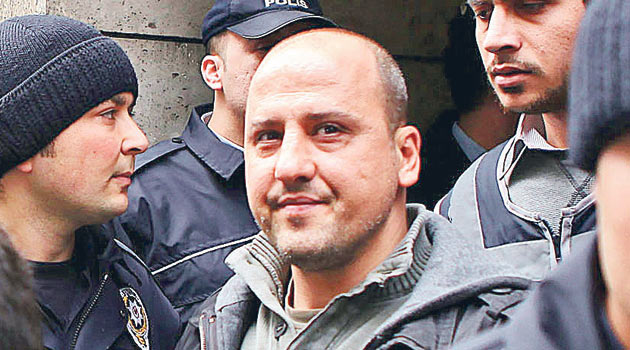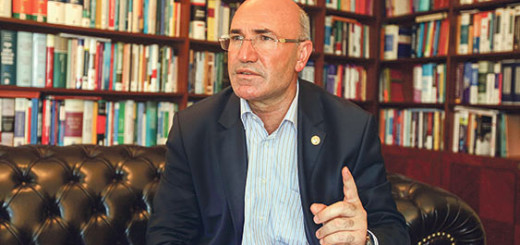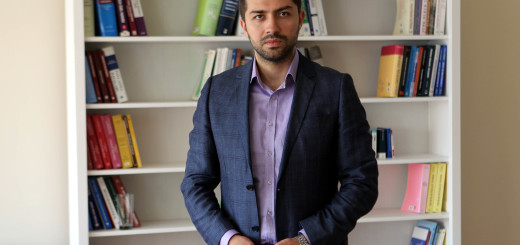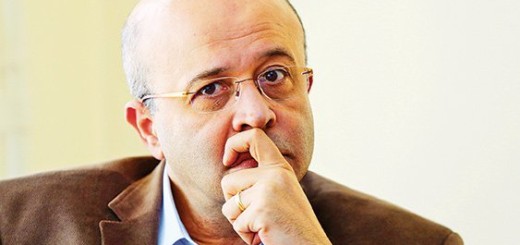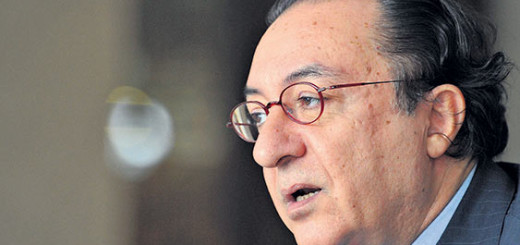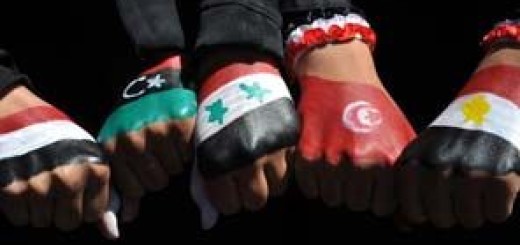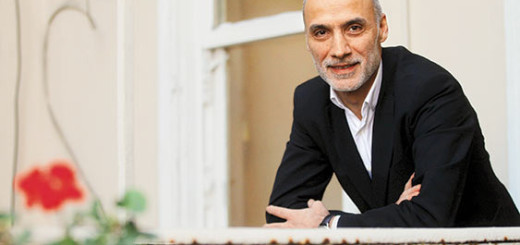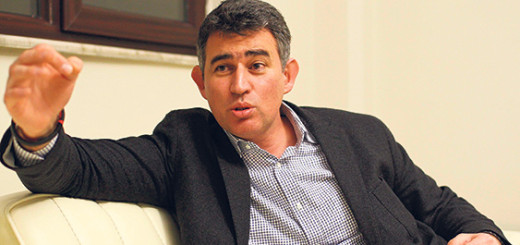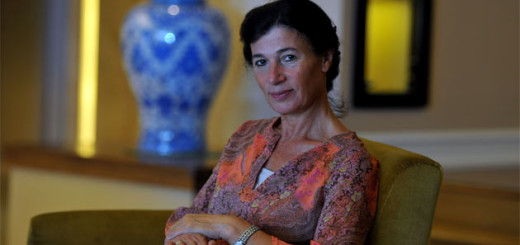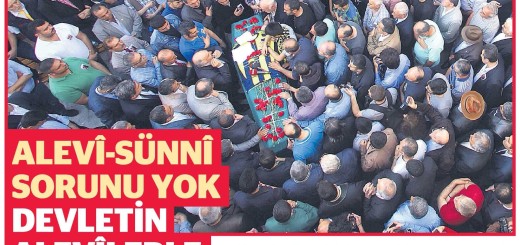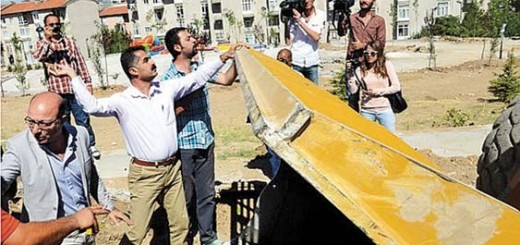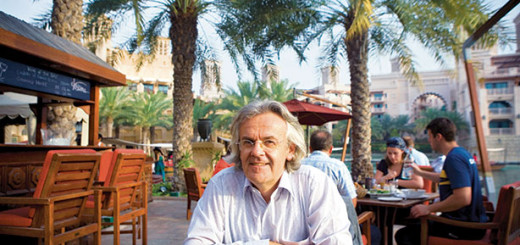
Süleyman Yaşar (Photo: Today’s Zaman)
Süleyman Yaşar, economist, former bureaucrat and journalist, has drawn a bleak picture of the Turkish economy and warns that the country is very likely to experience an economic crisis if the current situation in the economy continues.
“It would be wrong to define it as a crisis at this stage. However, if this poor performance lingers on in coming months, if foreign capital inflow declines, if the government continues to hinder publicly traded companies, if the arbitrary audits continue to harass foreign investors, i.e., if the tyrannical state mentality continues to haunt the country’s economy, an economic crisis will certainly come,” he told Sunday’s Zaman in an exclusive interview.
Criticizing the lavish public expenditure, for instance constructing a luxurious presidential palace and purchasing a luxury plane for current President Recep Tayyip Erdoğan, he said these expenditures made with short-term foreign debt do not provide any return on the investment, therefore putting public finance at high risk.
According to Yaşar, the Justice and Development Party (AK Party) government is following a hypocritical policy in relation to the interest rate lobby, which it accused of being behind the anti-government Gezi Park protests of 2013.
He said the government may be defaming the interest rate lobby, but at the same time it gave into the interest lobby.
“The Competition Board discovered several banks had agreed to offer lower interest rates for deposits, but apply high interest rates for consumer loans and credit cards. Even some public banks were part of the gang. Public banks constitute 50 percent of the Turkish banking system. Therefore, if the government allows these banks to make such cartel agreements, it means that it is collaborating with the interest rate lobby,” he said.
Yaşar does not have any faith in the AK Party targets for 2023 either, such as raising the per capita income to $25,000. He said, to make this happen the per capita income must increase by 8.8 percent every year, including this year. At the moment it is not increasing, but decreasing.
With regards to government efforts to sink Bank Asya, a lender affiliated with the faith-based Hizmet movement, the economist said it is technically impossible to sink Bank Asya because the bank works according to Islamic principles. This means it shares profits and losses, it does not have fixed costs, its investments are in the form of partnership with a company and it works on an interest-free basis.
“The efforts to sink an Islamic bank actually indicate that they [the government] have problems with Islamic ethics,” he said, warning that the government’s attempts to sink a bank will have an impact on the entire economy.
Some say there is an economic crisis around the corner. According to the government, everything is on the right track…
To assess how an economy has been performing we have performance criteria; this includes, inter alia, growth, the rise in per capita income, unemployment and inflation rates. Looking at the Turkish economy, we see there are decreases in these figures. The per capita income is less than the previous year. It was around $10,780 last year and it is $10,500 this year, about a $300 decrease. Also, the inflation rate is far above the target figure. The target set by the Central Bank of Turkey was 5 percent initially. Later, it was revised to 7.6 percent. The latest revision is 9.4 percent. The declining growth rate, the rise in the rate of inflation and the decrease in the per capita income indicate that Turkey’s economy is not performing well.
But, is it a crisis?
It would be wrong to define it as a crisis at this stage. However, if this poor performance lingers on in coming months, if the foreign capital inflow declines, if the government continues to hinder the publicly traded companies and if the arbitrary audits continue to harass foreign investors, i.e., if the tyrannical state mentality continues to haunt the country’s economy, an economic crisis will certainly come. The International Monetary Fund (IMF) noted that Turkey’s annual need for foreign currency is 25 percent of gross domestic product (GDP). This corresponds roughly to about $200 billion. Of this, $130 billion represents short-term foreign debt. When paying these debts, problems may arise and this may drag Turkey into a crisis. This is the risk. The short-term foreign debt, i.e., hot money debt, of the public banks rose by 52 percent in the last 15 months. In other words, the public banks could run into big problems if they continue to borrow hot money, but make poor investments using it.
How are these short-term debts invested?
We see there is a certain level of wastefulness in the public finance and in the public sector. If you look at the AK Party palaces and luxury planes you can understand where the money is spent. These luxury expenditures exceed $1 billion. It is said that these expenditures were financed by the public banks, which secured hot-money debt. Therefore, this is a risk in terms of public finance.
Can we talk about a deficit in the budget?
Currently, there is not a huge deficit. But if the public banks are forced to obtain short-term foreign debt, as was done in the run-up to the 2001 crisis, they will run into problems in repaying those debts. If you opt for securing foreign debts, you have to make sound investments that will produce high returns. But if you build AK Palaces or buy luxury plans with these short-term foreign debts, these are expenditures without any return on investment. Therefore, they put public finance at high risk. The public banks were used just in the same way before the infamous 2001 crisis. In particular, the public banks extended cheap loans to specific [pro-government] groups. The difference was paid by the Treasury. The public banks offered high interest rates for deposits that they transferred to the Treasury, triggering an irreversible collapse. Eventually, the banking system stepped into the crisis. We are witnessing similar practices.
They say that the foreign debts are actually loans secured by citizens…
But the public sector’s share in the $130 billion short-term foreign debt was initially low. It began to increase in recent years; therefore, we can conclude that the public sector is also borrowing hot money. Moreover, the government is also responsible for increased short-term borrowing by citizens. It is the government that has paved the way for borrowing hot money. It has done this by making imports more profitable than exports and by surrendering to the interest rate lobby.
How can the government be so submissive to the interest rate lobby when it harshly criticizes it?
The government may be defaming the interest rate lobby, but the government gave in to the interest lobby. The ruling party is collaborating with the interest rate lobby, and we see that the government is being duplicitous. There is always inconsistency between what it says and what it does. It publicly criticizes the interest rate lobby, but it cooperates with it behind the scenes. The Competition Board discovered several banks had agreed to offer lower interest rates for deposits but apply high interest rates for consumer loans and credit cards. Even some public banks were part of the gang. Public banks constitute 50 percent of the Turkish banking system. If the government allows these banks to make such cartel agreements, it means that it is collaborating with the interest rate lobby.
Is this the reason why the government is reluctant to privatize the public banks?
Ziraat Bank and Halkbank are supposed to be privatized under Law No. 4603. Fourteen years have elapsed since the passage of this law, but they have not been privatized. The ruling party is collaborating with the interest rate lobby via public banks to exploit the citizens. Although they are supposed to be privatized, some public banks and insurance companies are preparing to enter the interest-free banking sector. What has the state got to do with banks or insurance companies? If there is a regulatory body, i.e., the Banking Regulation and Supervision Agency (BDDK), which has all the required powers and authorities, it is meaningless for the government to meddle with the banking sector. If it still steps in, this means it seeks certain benefits or aims to protect the interests of certain people. This is another indication of inconsistency.
What do you criticize about the current economic policy?
The current wheat production is the same as it was when they came to power in 2002. For the last 12 years, not a single investment has been made in export products, and agricultural exports have stalled. The projects which may boost agricultural production such as the Southeastern Anatolia Project (GAP) and Konya Plain Project were not finished, and due attention has not been given to the manufacturing sector and there has been a steady decline in the production of wheat and barley. Agricultural production is still low despite increasing population and income. The result is a system where importing goods with hot money is profitable. This leads to an increased current account deficit (CAD) and rising inflation and unemployment rates. The unemployment rate is currently 9.05 percent. For a ruling party to be considered successful the unemployment rate should be lower. When this ruling party came to power, the unemployment rate was above 9 percent. It follows that they have been unable to lower it. This is another benchmark showing that they are unsuccessful with the economy.
Özal and Menderes were not fond of luxurious life
Some say that the current period is a continuation of the legacy of Adnan Menderes and Turgut Özal.
This is what the ruling party publicly claims, but a close inspection reveals that this is not the case. Neither Menderes nor Özal indulged in luxury. They led modest lives. They did not have luxury palaces and airplanes. What we see today is excessive indulgence in luxury. This is no indication of a country’s growth; rather it slows down the growth because they constitute investments without any return. Instead of building a palace for $1 billion, this money could be provided as loans to small and medium-sized enterprises (SMEs) with significant return on investment. Those who say this is not a big sum don’t know how to count. This figure is very high. The growth rate during the 10-year term in office of Menderes was 6.6 percent, and it was 5.9 percent for Özal, but it is 4.7 percent for the current ruling party.
Will luxury and welfare continue?
Seeing how the ruling party indulges in luxury, citizens become more eager to do the same. Of course, it is everyone’s wish that the welfare of the people improves and they enjoy better living conditions. But if this is done by using debt, this amounts to unsustainable luxury. It is becoming harder to maintain prosperity. The recent developments indicate that we lead luxurious lives based on foreign debt. For the last eight years I have been arguing that investments should be made to boost exports. But what do they do instead? They build shopping centers, houses and residences for the sake of rent. They import luxury cars. Yes, Turkey needs housing investment, but it needs healthy and earthquake-resistant houses.
The Medium-term Economic Program was recently announced by Ali Babacan. What is your impression?
As he was announcing it, he said, “We are Europe’s fastest-growing country.” He has made the same remark before. This is what I cannot understand. Germany’s per capita income is $45,000. When Germany grows by 1 percent, its per capita income rises by $450; however, when we grow by 3 percent, our per capita income, which is $10,000, increases only by $300. So theirs increases at a higher pace than ours. I think this is an effort to deceive the general public. They frequently bring the 2023 targets to the agenda.
Is it possible to achieve these targets?
No, it is not. This is because one of these targets is to raise the per capita income to $25,000. To make this happen, the per capita income must increase by 8.8 percent every year, including this one. Currently, it is not increasing but decreasing. Raising the national income to $2 trillion is a fantasy and boosting the exports to $500 billion is another one. What do we have to export in the first place? We are not investing in the production of exportable products. The message given to the citizens is: “Eat, drink, consume. You don’t have to produce anything, but you should keep silent and be thankful for what you have.” But they themselves are not grateful. They search for ways to have and own more and more. They waste taxes that should have been used to finance infrastructure projects. We don’t have products to export.
What will be the effect of the imminent threat from the Islamic State of Iraq and the Levant (ISIL) and any worsening in the situation in the southeastern provinces on the country’s economy?
The ruling party’s ambiguous foreign policy, its fanciful targets and its failure to correctly analyze the developments in the region have put Turkey in a difficult position. This is not my assessment alone. It is shared by former Foreign Minister Yaşar Yakış, who closely knows the AK Party and the region, as well as other former AK Party deputies and founders who voice similar arguments. If you don’t pay heed to these people but run after fanciful targets, you will end up in a predicament. Our relations with the Middle Eastern countries have worsened considerably. We have huge problems with Iraq, Syria and Egypt. We withdrew our ambassadors and trade attaches from many Middle Eastern countries. We can no longer do business with them. This has a negative impact on our economy. During the time he served as foreign minister, Ahmet Davutoğlu was unable to take measures to prevent ISIL from sabotaging our oil pipelines. As a result, oil prices rose to $116. A terrorist organization has been sabotaging our pipelines since the start of the year, hindering the oil flow, but our foreign minister chose to turn a blind eye to it. Since they failed to meddle with it, instead covering it up, this organization has come to our borders. Oil prices rose as oil was exported via Turkey. This foreign policy mistake had a heavy toll on the economy.
You say the presidential system does not work in developing countries. Does this mean it won’t work for Turkey either?
The developing countries tend to have institutions that are not sufficiently established. They tried to govern the Kyrgyz with the presidential system for about 20 years. During this time, the son, daughter, wife and relatives of the president took about half of the trade under their control. Privatizations were made via a company owned by the president’s son. The price of everything in the country rose. This prompted the general public to take to the streets for protests. The president and his family fled the country. Seeing that the presidential system did not work, they transitioned to the parliamentary system. The same thing happened in other developing countries. Presidential systems or one-man rule will lead to authoritarianism. It is impossible to implement the presidential system in a country that lacks a functioning legal system. Any effort to introduce it leads to authoritarianism. Thus, the developments in Turkey indicate that the presidential system or single party governments where the president and the prime minister are from the same party cannot introduce democracy. What we need badly is a coalition government and a parliamentary system.
Those who want to sink an Islamic bank have problems with Islam’s ethics
Referring to the government’s efforts to sink Bank Asya, you said, “An Islamic bank cannot sink.” What should we understand from this assertion?
Bank Asya and other participation banks work according to Islamic principles, i.e., based on the principle of sharing profits and losses. They don’t have fixed costs. Their investments are in the form of partnership with a company. They work on an interest-free basis. Therefore, such a system cannot be sunk. They don’t invest money in areas without a return on investment. They invest money according to Islamic rules. Thus, they avoid risk. For this reason, no one can force an Islamic bank to go bankrupt. The efforts to sink an Islamic bank actually indicate that they have problems with Islamic ethics. When you try to single out and sink a bank, this will have an impact on the entire economy. The entire banking system and economy will be changed. This will banish foreign investors. You cannot manage the economy with one-man rhetoric. Independent institutions are established so that they can work to regulate the sector independently, without intervention. If these independent institutions are meddled with and if instructions are given to them, this shows that the system is malfunctioning.
It was reported that the land allocated to dissident businessmen will be seized. What does this report mean?
It is a clear indication of the pressures on businessmen. The government is trying to harass dissident businessmen by passing arbitrary laws. These practices scare investors. They refrain from making any investment, fearing that similar things may happen to them. We don’t have a predictable legal system. If you send tax investors to dissident businessmen and issue meaningless fines to them, you create an unpredictable legal system and no one will be eager to make investments in your country. Even Turkey’s local investors are seeking ways to invest abroad. With this rhetoric and attitude, the ruling party is driving local investors away and helping other countries to grow and tackle the unemployment problem.
A columnist does not have a superior
You are known as the columnist who made Erdoğan avoid signing an agreement with the IMF. You used to support the AK Party’s economy policies. Why did you fall foul?
It wasn’t me who fell foul, but them. I maintain my position. The AK Party’s senior figures have changed. I have been saying the same thing for years. They don’t want me to say that luxury consumption will lead to an unsustainable economy. Thus, they fall foul of my arguments. If they start to pursue correct economic policies, I will certainly endorse them. Currently, their policies are misguided, and I criticize them. It is obvious that their policies are completely wrong. I don’t have any emotional bond with the government.
It is said that you were fired from the Sabah daily because you failed to lambaste the “parallel structure” and you are the husband of Neşe Düzel, the editor-in-chief of the government-critical Taraf newspaper and you are a consultant to Taraf and you know the ins and outs of Halkbank. What is the truth?
I am an economist and I rely on data. I interpret economic data, and I don’t write solely to criticize a specific person or institution. I was truthful about the figures, but they didn’t like it. I don’t work as a consultant for anyone. I have not worked as a consultant when I have been working as a columnist. This is already something I oppose. Meanwhile, I lend my support so that the Taraf newspaper may survive. There are serious pressures on this paper. I don’t know anyone from Halkbank and I haven’t had any ties with it before, so how can I know its ins and outs?
After you were fired from Sabah, you quickly found a job at Taraf, which some people claimed was thanks to your wife…
I was working for Taraf before I started to work for Sabah. I just returned to my previous paper.
How does it feel to write columns for a paper where your wife is an editor-in-chief?
We are like two professionals working in the same organization. I am writing for the paper from outside. Of course, we exchange ideas. But Neşe never meddles with my articles. A columnist does not have a superior. They should leave if that happens, just as I did with Sabah.
What is the reason for the polemics between you and Sabah columnist Engin Ardıç?
This person taunted first Neşe and then me for no reason at all. I don’t know him. He wrote articles containing remarks that border on insult. I think he needs to engage in polemics to increase his readership. Or he may be currying favor with someone or receiving instructions from others.
